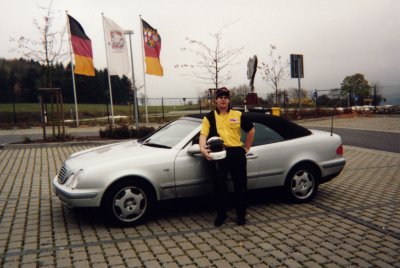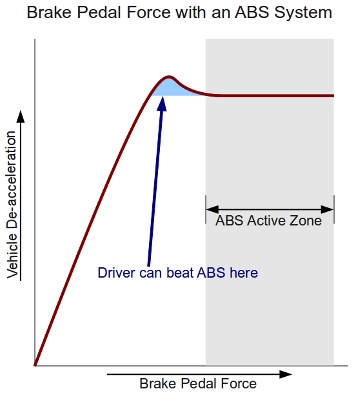Antilock Braking Systems

I had the good fortune to fly to Germany on a business trip, seated next to a Chrysler brake engineer. This engineer had with him a plot of braking force vs pedal force for a number of Chrysler cars.
Every graph had a similar shape: a line that rose sharply with increasing pedal force, followed by a little dropoff, followed by a flat line. It was explained to me that the dropoff and flat line in braking force was the ABS engaging - once the ABS is on, braking rate is flat no matter how hard you push on the pedal.

But it was that little bump that was interesting. That bump indicates the area where a human can outbrake the ABS. If the driver is properly threshold braking, properly modulating the brake pedal force to stop just short of activating the ABS, he can stop the vehicle faster than if the ABS is actively pulsing.
My own testing proved it. On concrete, with race tires on, I could consistently outbrake the ABS system.
So anybody whose plan is to stand on the brakes and let the ABS do the work is giving up time because it doesn't stop the car as fast.
However, the opposite is true in the wet or if you find yourself needing a steering input during hard braking; In these cases, the wheel locks much more easily and the ABS is capable of far finer control than the driver. Plus the ABS can control individual wheels (or pairs of wheels in older systems) where the driver cannot. In low-grip conditions, the ABS is going to be better than any driver.
Plus, in a closed-wheel car where you can't see the wheels the way you can in a open-wheel (Formula) car, the buzzing of the ABS system provides unmistakable feedback of wheel locking. If you treat the ABS engagement as "wheel lock" it makes it much easier to threshold brake than without it.
And on top of all this, sticky, soft race tires will flatspot in a heartbeat if locked up. ABS will, if nothing else, keep your expensive race tires round. A friend of mine used to convert his Hoosiers into octagons on a regular basis, and after he installed ABS, eliminated tire flatspotting.
I had an opportunity to drive a pair of Dodge Vipers; one with ABS, one without, and the ABS car was unquestionably faster. You could push harder and brake deeper, not because the ABS was doing the work, but because locking a wheel in the ABS car was a non-event, where locking a wheel in the non-ABS car (which was ridiculously easy) would result in a mini-slide that would totally screw up the entry to the corner. Accordingly, you had to brake just that much softer and gave up time to the ABS car.
Although the quality of individual ABS systems may vary quite a bit (some of the cheaper systems can be somewhat crude) I have yet to encounter an ABS system that didn't ultimately make the car faster. Even if it weighs 50+ pounds and makes your engine bay all ugly, you will be faster with it there.
If your rules allow ABS, use it.

 Launch Control
Launch Control

